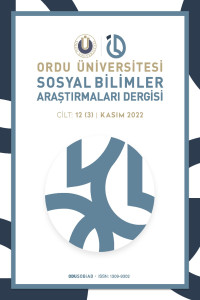Öz
This study aims at studying psych verbs in Spanish and Turkish. Psych verbs are analyzed in many languages because they generally show different properties compared to other verbs. The study’s main aim is to compare and contrast psych verb categorizations in Turkish and Spanish and to define the similarities and differences between them. Doing so, it is possible to decide whether or not these structures have the same features that separate them from other verbs in two languages which are not typologically similar. If some similarities exist between the structures of two languages, this might imply that these psych verbs have some specific structure in different languages, and it might benefit the literature on universalities in languages. In regard to degree, psych verb categorization is similar when looking at the experiencer roles. However, the number of categories is different based on the theta roles and case marking in two languages. Related to type, Spanish does not have dative and ablative themes in psych verb constructions unlike Turkish. However, the structures of gustar-type verbs, which requires the theme to agree with the verb untraditionally, have similar structures in two languages.
Anahtar Kelimeler
contrastive analysis psych verbs gustar-type verbs Turkish Spanish
Kaynakça
- Arad, M. (1998). Psych-notes. Ucl working papers in linguistics, 10, 203-223.
- Belletti, A., & Rizzi, L. (1988). Psych-verbs and θ-theory. Natural Language & Linguistic Theory, 291-352.
- Cagri, I. M. (2005). Minimality and Turkish relative clauses. University of Maryland, College Park.
- Kuram, K. (2005). Transformational approach to psych verbs: evidence from Turkish.
- Fábregas, A., Marín, R., & McNally, L. (2012). From psych verbs to nouns. Telicity, change, and state: A cross-categorial view of event structure, 162-184.
- Franco, J. (1992). Towards a typology of psych verbs: Evidence from Spanish. Anuario del Seminario de Filología Vasca" Julio de Urquijo", 119-134.
- López Jiménez, M. D. (2003). Grammar instruction and the acquisition of gustar-type verbs by English-speaking learners of Spanish. ELIA, 4, 255-279.
- Miglio, V., & Flores, O. M. (2012). Heritage speakers’ judgment of non-nominative subjects: Spanish gustar. In Proceedings of the 10th Annual Hawaii International Conference on Education (HICE).
- Montrul, S. (2001). First-language-constrained variability in the second-language acquisition of argument-structure-changing morphology with causative verbs. Second Language Research, 17(2), 144-194.
- Özsoy, A. S. (2009). Argument structure, animacy, syntax and semantics of passivization in Turkish: A corpus-based approach. Corpus analysis and variation in linguistics, 259-279.
Öz
Bu çalışma Türkçedeki ve İspanyolcadaki duygu durumu bildiren eylemleri incelemeyi amaçlar. Duygu durumu bildiren eylemler birçok dilde analiz edilmişlerdir çünkü bu eylemler diğer eylemlerle karşılaştırıldığında farklı özellik gösterirler. Bu çalışmanın amacı Türkçe ve İspanyolca duygu durumu bildiren eylem sınıflandırmalarını karşılaştırmak ve aralarındaki benzerlik ve farklılıkları tanımlamaktır. Bunu yaparak, tipolojik olarak farklı bu iki dilde, bu yapıların onları diğer yapılardan farklı kılan benzer özelliklere sahip olup olmadıklarına karar vermek mümkündür. Eğer iki dilin yapıları arasında benzerlikler mevcutsa, bu durum duygu durumu bildiren eylemlerin farklı dillerde belli bir yapısı olduğu anlamına gelebilir ve dillerdeki evrensellik üzerine olan alanyazına katkıda bulunabilir. Derecelendirme açısından, eyleyen rollerine bakıldığında duygu durumu bildiren eylemlerin sınıflandırılması benzerdir. Fakat iki dildeki tematik rollere ve durum ilgeci atamalarına bağlı olarak sınıf sayıları farklılık göstermektedir. Türe bağlı olarak, İspanyolca Türkçenin aksine duygu durumu bildiren yapılarda ayrılma ve yönelme konu rollerine sahip değildir. Fakat geleneksel durumun aksine konu rolünün fiil ile uyumunu gerektiren gustar-tipi yapılar her iki dilde de benzer yapıya sahiptirler.
Anahtar Kelimeler
karşıtsal çözümleme duygu durumu bildiren eylemler gustar-tipi eylemler Türkçe İspanyolca
Kaynakça
- Arad, M. (1998). Psych-notes. Ucl working papers in linguistics, 10, 203-223.
- Belletti, A., & Rizzi, L. (1988). Psych-verbs and θ-theory. Natural Language & Linguistic Theory, 291-352.
- Cagri, I. M. (2005). Minimality and Turkish relative clauses. University of Maryland, College Park.
- Kuram, K. (2005). Transformational approach to psych verbs: evidence from Turkish.
- Fábregas, A., Marín, R., & McNally, L. (2012). From psych verbs to nouns. Telicity, change, and state: A cross-categorial view of event structure, 162-184.
- Franco, J. (1992). Towards a typology of psych verbs: Evidence from Spanish. Anuario del Seminario de Filología Vasca" Julio de Urquijo", 119-134.
- López Jiménez, M. D. (2003). Grammar instruction and the acquisition of gustar-type verbs by English-speaking learners of Spanish. ELIA, 4, 255-279.
- Miglio, V., & Flores, O. M. (2012). Heritage speakers’ judgment of non-nominative subjects: Spanish gustar. In Proceedings of the 10th Annual Hawaii International Conference on Education (HICE).
- Montrul, S. (2001). First-language-constrained variability in the second-language acquisition of argument-structure-changing morphology with causative verbs. Second Language Research, 17(2), 144-194.
- Özsoy, A. S. (2009). Argument structure, animacy, syntax and semantics of passivization in Turkish: A corpus-based approach. Corpus analysis and variation in linguistics, 259-279.
Ayrıntılar
| Birincil Dil | İngilizce |
|---|---|
| Konular | Dil Çalışmaları |
| Bölüm | İNCELEME MAKALESİ |
| Yazarlar | |
| Yayımlanma Tarihi | 30 Kasım 2022 |
| Gönderilme Tarihi | 26 Nisan 2022 |
| Yayımlandığı Sayı | Yıl 2022 Cilt: 12 Sayı: 3 |
Bilginin ışığında aydınlanmak dileğiyle....
ODÜSOBİAD


